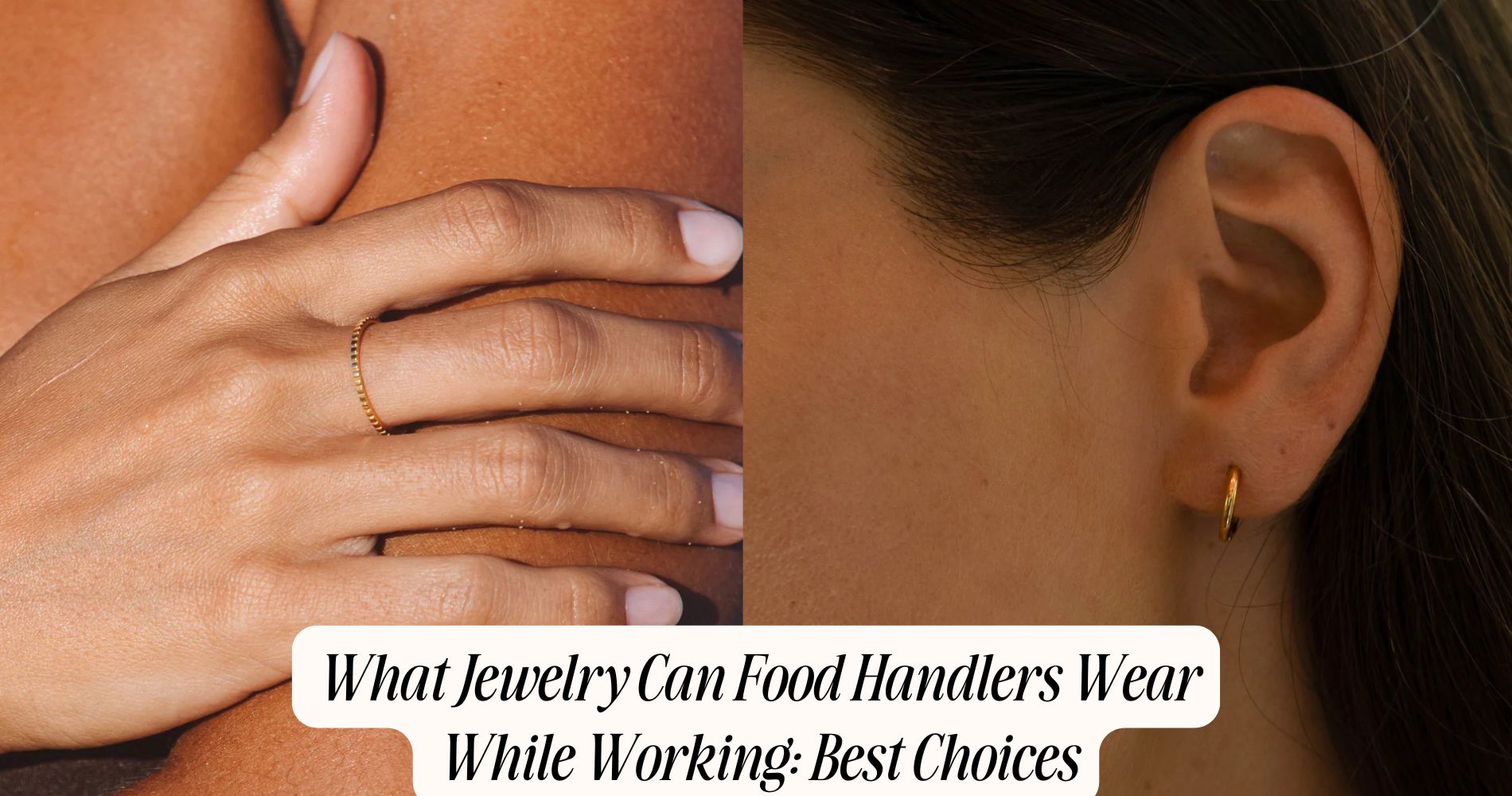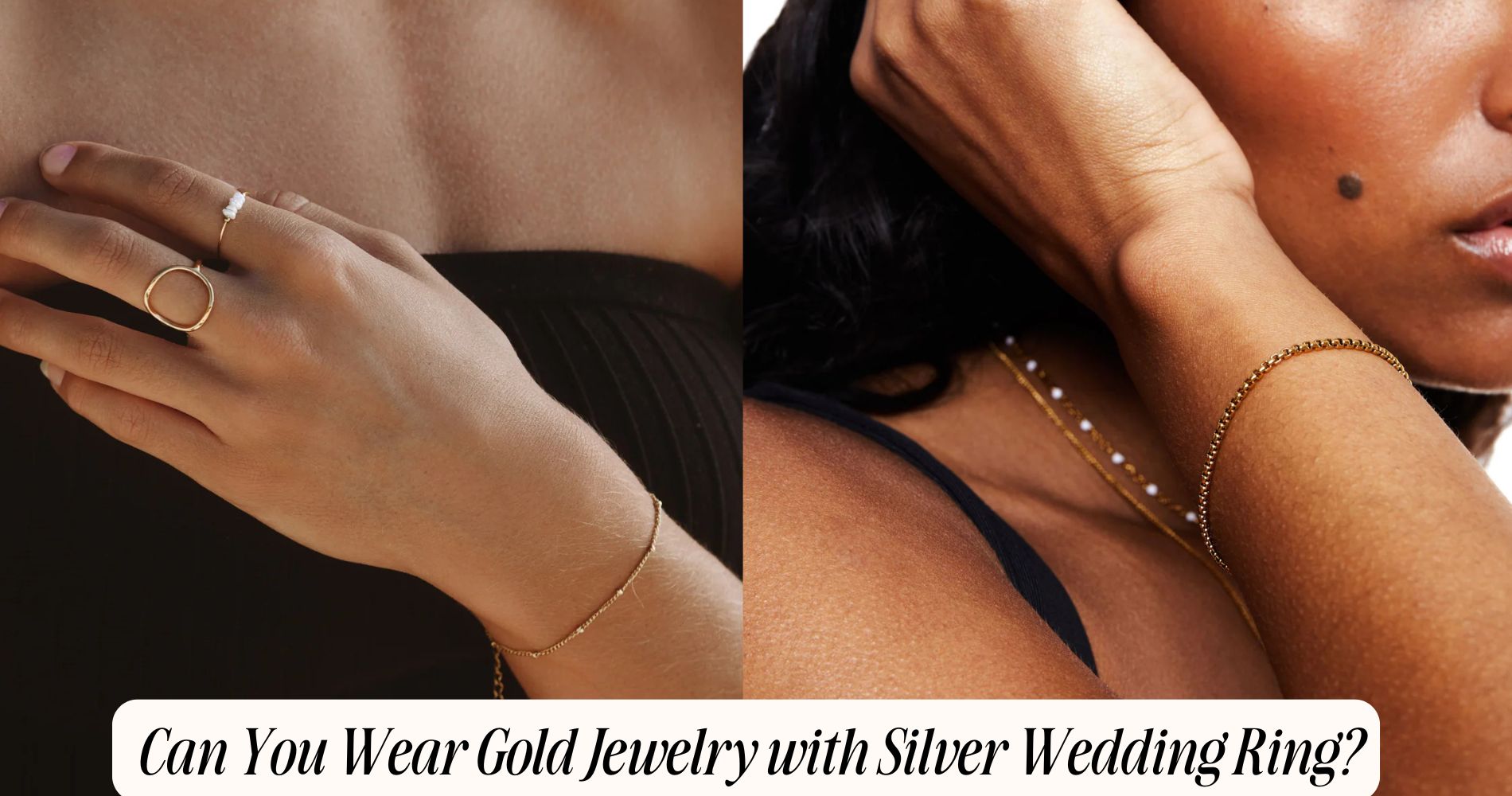
What Jewelry Can Food Handlers Wear While Working: Best Choices
What jewelry can food handlers wear while working? If you work in the food industry, it’s essential to wear minimal, secure jewelry to ensure safety and hygiene. Opt for simple stud earrings made of stainless steel or plastic. If you choose a necklace, make sure it’s tightly secured and non-dangling. Silicone wristbands or watches are also acceptable. For rings, stick to snug-fitting options made of silicone or stainless steel. Avoid loose jewelry that could trap food particles or get caught on equipment. Following these guidelines helps maintain hygiene standards while you work. Need safe and stylish options? Explore our hypoallergenic jewelry collection.
Importance of Jewelry Regulations
When you consider the role of food safety, understanding the importance of jewelry regulations becomes fundamental.
Jewelry hygiene directly impacts the overall safety of the food you handle. Loose or dangling jewelry can trap food particles and bacteria, posing a contamination risk. It's imperative to minimize this risk for both the food and your own employee safety.
By adhering to jewelry regulations, you not only protect the integrity of the food but also create a safer work environment. Additionally, removing or restricting jewelry helps maintain a professional appearance and guarantees that you're focused on your tasks without distractions.
Ultimately, following these regulations is essential for upholding high standards of hygiene and safety within any food handling operation.
Acceptable Jewelry Options
Following jewelry regulations doesn't mean you have to forgo all adornments entirely. There are several acceptable jewelry options that food handlers can wear while working.
Simple stud earrings made from safe materials like stainless steel or plastic are a great choice, as they minimize the risk of contamination. Necklaces can be worn if they're secured tightly and made of non-dangling materials.
Additionally, wristbands or watches made of silicone or other non-porous materials can be appropriate. It's important to avoid items that can trap food particles or harbor bacteria.
Rings: What to Consider
Rings can pose unique challenges for food handlers, so it's essential to choose wisely. When selecting a ring, consider the materials; options like silicone or stainless steel are preferable as they're less likely to harbor bacteria.
Avoid porous materials that can trap food particles and compromise ring hygiene. Additionally, make certain the ring fits snugly to prevent it from falling off while you're working. Loose rings can lead to contamination or even accidents.
Regularly clean your ring and maintain proper hygiene to minimize risks. Remember, your primary responsibility is to guarantee food safety, so make informed choices about your jewelry to uphold these standards while you work.
Earrings and Necklaces Guidelines
While earrings and necklaces can enhance your appearance, they can also introduce potential hazards in food handling environments.
When choosing earring styles, opt for smaller, stud-like designs that won't dangle or catch on equipment. Avoid large hoops or elaborate designs that may fall or trap food particles.
For necklaces, select materials that are easy to clean and won't snag on clothing or gear. Simple chains made of stainless steel or other non-porous materials are preferable.
Always confirm that any jewelry you wear is securely fastened and won't interfere with your tasks.
Prioritizing safety while still expressing your style is essential in maintaining a hygienic workspace.
Jewelry to Avoid in Kitchens
When working in the kitchen, it's vital to avoid certain types of jewelry that can pose risks.
Loose rings and bracelets can get caught in equipment, while dangling earrings may lead to accidental snagging.
Additionally, necklaces and chains can create hazards, so opting for minimal, secure options is essential for safety.
Loose Rings and Bracelets
Loose rings and bracelets can pose significant risks in kitchen environments, as they may easily catch on equipment or become contaminated with food.
When you're handling food, maintaining personal hygiene is vital, and jewelry that dangles or moves can hinder this effort. Loose accessories can trap dirt and bacteria, compromising safety measures you implement in the kitchen.
Additionally, they can be a hazard, potentially leading to accidents that could injure you or others. To guarantee a safe working environment, it's best to avoid wearing loose rings and bracelets altogether.
Instead, opt for secure, minimal jewelry that won't interfere with your tasks, allowing you to focus on food safety and hygiene while working efficiently.
Dangling Earrings Risks
Dangling earrings pose a unique risk in kitchen environments, as they can easily get caught in equipment or become contaminated during food preparation.
These safety hazards not only endanger your well-being but can also lead to hygiene concerns that compromise food safety. For instance, if earrings snag on machinery, they could cause accidents or injury.
Additionally, the material of dangling earrings can harbor bacteria, posing further risks to the cleanliness of food products.
Given these factors, it's best to leave dangling earrings at home when working in the kitchen. Instead, opt for stud earrings or no jewelry at all to maintain a safe and sanitary workspace that prioritizes both your safety and the well-being of the food you handle.
Necklaces and Chains Hazard
Necklaces and chains can also pose significant hazards in kitchen environments. When you work with food, maintaining necklace safety is vital. Loose chains can easily catch on equipment, leading to accidents that could injure you or compromise food safety. Chain restrictions are often implemented in professional kitchens to minimize these risks.
If you wear a necklace, it can inadvertently fall into food or get tangled, creating potential contamination issues. Additionally, the presence of jewelry can distract you from your tasks, increasing the likelihood of spills or mishaps.
To guarantee a safe working environment, it's best to leave necklaces and chains at home. Prioritizing safety means keeping your focus on food handling without the added risks of loose jewelry.
Best Practices for Jewelry Use
When working in food handling environments, it's crucial to minimize the risk of contamination, which means you should carefully consider your jewelry choices.
To maintain jewelry hygiene, limit the types of jewelry you wear. Opt for simple, non-porous items like stud earrings or a plain wedding band. Avoid rings with stones or intricate designs that can trap bacteria.
Always follow safety standards by removing any jewelry that could potentially fall into food or attract contaminants. Regularly clean any jewelry you wear to guarantee it remains hygienic.
Frequently Asked Questions
Can Food Handlers Wear Watches While Working?
Yes, you can wear wristwatches while working, but make certain they're made from non-porous materials for better wristwatch hygiene. Avoid fabric bands; they can trap bacteria and compromise food safety. Regularly clean your watch to maintain hygiene.
Are There Specific Regulations for Food Handlers' Jewelry?
Yes, there're specific jewelry regulations for food handlers to guarantee food safety. Generally, only plain wedding bands are allowed, while loose or dangling jewelry can harbor bacteria, posing a risk in food preparation environments.
What Are the Health Risks of Wearing Jewelry in Kitchens?
Wearing jewelry in kitchens poses health hazards, compromising hygiene practices. Jewelry can trap bacteria, contaminate food, or cause injuries. By avoiding jewelry, you enhance safety and maintain cleanliness while working in food preparation environments.
How Often Should Jewelry Be Cleaned in Food Environments?
You should clean jewelry frequently in food environments, ideally daily. Materials like stainless steel and silicone are easier to sanitize, while porous materials may require more attention to prevent contamination and maintain hygiene standards.
Conclusion
In summary, adhering to jewelry regulations is essential for maintaining safety and hygiene in food handling environments. Opt for simple, minimal pieces like plain rings and small studs, while avoiding dangling earrings and bracelets that can trap food particles. By following these guidelines and best practices, you'll not only protect the integrity of the food you prepare but also contribute to a safer workplace. Remember, less is more when it comes to jewelry in the kitchen.
























Leave a comment
This site is protected by hCaptcha and the hCaptcha Privacy Policy and Terms of Service apply.